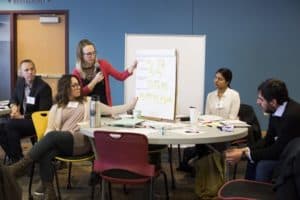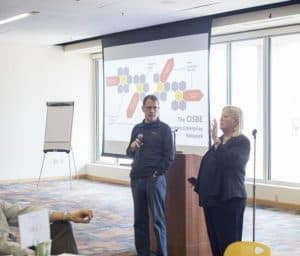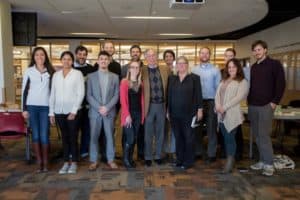 It’s not uncommon to consider graduate school life-changing, but a single course?
It’s not uncommon to consider graduate school life-changing, but a single course?
Yet, CityCraft®, a class offered to graduate students in the Master’s in Real Estate and the Built Environment program, is having that effect on students. The course is more of a philosophy, where students learn how to restore communities economically, environmentally and socially.
“After absorbing that class and all its techniques, I knew my life had changed,” said Taylor Iascone (MS 2017).
Iascone’s father and brother are in construction and real estate development. While her early career was in hospitality, Iascone wanted a new challenge and was inspired to change fields after talking with Burns Program Director Barb Jackson.
“Her philosophical interpretation made complete sense in my mind,” Iascone said. “A systematic approach to redeveloping/developing the world.”
An expert in integrated project design, Jackson is known for her big thinking in the construction industry. Yet, she wanted the Burns students to learn about regeneration from someone in the industry who was doing it and could give the students hands-on experience. She turned to CityCraft® Founder and President John L. Knott, Jr.
While the company has offices in Charleston and Atlanta, its Integrated Research Center is in Denver, where employees are working to transform West Denver.
“We see people as assets,” Knott said. “We try and identify all the resources that exist in the community. We can’t get to a sustainable future without looking at everything involved—infrastructure, environment, education. People have to understand the complexity and how so many sectors are involved.”
Knott is continuing a family tradition started by his grandfather Henry A. Knott in 1908, which was rooted in the “Master Building” tradition. Knott says his family is in the community-building business, where they have a lifelong responsibility to develop and restore the social, spiritual, economic and environmental well-being of the area.
“The great reward of teaching at the Burns School has been getting to know Dr. Jackson, an integrated thinker and systems level design build leader, as well as the graduate students, who are responding to CityCraft’s® mindset. They are seeing themselves in the human habitat business capable of regenerating long term the economic, ecological and social health of the communities they serve,” Knott said. “They are the regenerative leaders we need!”
Meagan Knapp took the course in the summer of 2017, which focused on the West Denver Sun Valley neighborhood.
“I learned about the negative stigma and actions that surround the industry, and solutions to combat those actions,” Knapp said. “I learned about natural systems and how to work with them in specific geographic areas to use a space’s full potential.”
 Knapp says her entire outlook on her career path was altered as a result of CityCraft®. After she graduates in June, she hopes to form a company where she too can work on regenerative development.
Knapp says her entire outlook on her career path was altered as a result of CityCraft®. After she graduates in June, she hopes to form a company where she too can work on regenerative development.
“I thought I had a very philanthropic idea for what my future career would entail. Post-CityCraft® that plan has transformed into something so much bigger than I could have ever imagined for myself,” Knapp said.
Iascone is working as a project engineer for Swinerton Builders. She hopes the CityCraft® mindset will eventually thrive in commercial construction.
“I would challenge any REBE student with a strong financial background to take the CityCraft® course,” she said. “Not only does it challenge your perspective on pro forma analysis, but also forces you to gain a complete understanding of the triple-bottom-line.”
“We’ve been very intentional at the Burns School to provide the most advanced education that will have the greatest impact on the leadership and culture of real estate, development, design and construction, and the built environment as a whole,” Jackson said. “Young professionals seeking graduate degrees today want to learn more than just new techniques and tools. They want to learn how to lead and influence and make a difference. In our CityCraft® course they are learning how to do just that by connecting people, purpose and projects in ways that are sustainable economically, environmentally and socially, thereby changing people’s lives.”
